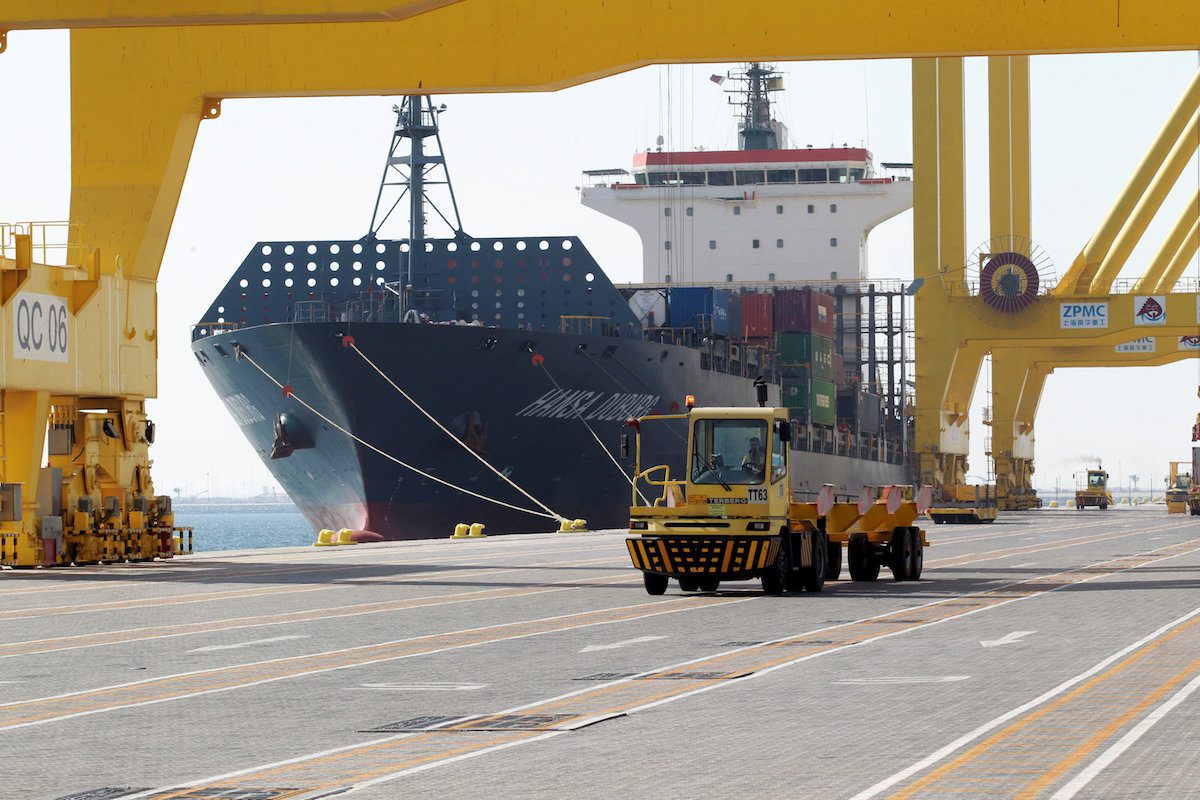Qatar Says New Port Will Help Circumvent Arab Sanctions
Updated: November 18, 2020 (Originally published September 5, 2017) HAMAD PORT, Qatar, Sept 5 (Reuters) – Qatar inaugurated a new $7.4 billion port along its Gulf coast on Tuesday that...

A ship decks at Hamad port in Doha, Qatar, June 14, 2017. REUTERS/Naseem Zeitoon
![]()
By John Davison HAMAD PORT, Qatar, June 15 (Reuters) – Qatar’s main seaport shows all the signs of having weathered the storm. Workers in hard hats monitor as giant yellow cranes lift hundreds of containers off cargo ships onto lorries waiting ashore.
Saudi Arabia, the United Arab Emirates (UAE) and Bahrain severed diplomatic, trade and transport ties with import-dependent Qatar 10 days ago, accusing it of supporting Iran and funding Islamist groups, charges Doha denies.
The spat initially halted much traffic to its Hamad Port and raised fears of food and other shortages.
But after launching new direct shipping routes to cope with the crisis, port officials say the worst is over and the episode may even help gas-rich Qatar seal new transport deals that do not rely on Gulf neighbors.
“It’s a blessing in disguise,” a port official said as cargo was unloaded on Wednesday.
“We’re looking at signing agreements with shipping companies that can improve direct services instead of having to come through Jebel Ali” in Dubai.
The first ship on a new direct weekly service from India’s Mundra Port was expected to arrive on Friday. Another route to India’s Nhava Sheva Port was announced late on Wednesday, after two new services opened this week from Oman, which has remained neutral during the crisis.
Earlier this week the world’s biggest container line, Maersk of Denmark, said it would accept new bookings for container shipments to Qatar from Oman.
Several Maersk containers could be seen parked among rows of shipments at Hamad Port. Operations manager Omar El-Khayat said another deal with Maersk was being discussed.
Mediation efforts to end the crisis have intensified, including by the United States, which has strong military ties with Qatar, host of the largest U.S. air base in the Middle East. Two U.S. Navy ships went through Hamad Port on Wednesday for a joint exercise with Qatar.
Port officials said the cutting of transport links by Saudi Arabia, the UAE and Bahrain with Qatar continues to affect some services.
Ships from China’s Shanghai, which normally go through Jebel Ali, have to be re-routed via Iraq, adding seven days to a normally 20-day voyage, one official said.
Not all lines have resumed shipping services.
China’s COSCO Shipping Lines Co Ltd, Taiwan’s Evergreen and Hong Kong Kong’s OOCL suspended container services to and from Qatar.
The closure of land borders is also likely to put pressure on Qatar to ensure continuity of supplies. Trade sources say sugar imports remain frozen given the country’s main suppliers are Saudi Arabia and the UAE.
Hamad Port’s general cargo terminal can handle 1.7 million tonnes of goods per year, according to Qatar’s transport ministry, but it is not a bulk cargo port.
Officials would not say at what capacity Hamad Port was operating compared to before the crisis, or whether it could handle increased demand.
The Qatar Ports Management Company, Mwani, gave no import figures for June.
But it hoped new services would help make up the shortfall.
Mwani’s Hamad al-Ansar said ties with Turkey and Iran, which have flown goods into Doha since the boycott, might expand, with Turkish vessels already on their way.
“We’ll open a relationship with anyone who can bring cargo.”
For now, port employees have their work cut out. As one large ship took back empty containers later in the day, a second one arrived bringing livestock from Australia.
“The first five days of the crisis there were fewer shipments. Now it’s back to normal. I’ve seen the schedule and it looks packed,” said a Kenyan supervisor.
Hamad Port’s imports include large quantities of food and building materials for construction projects including stadiums for the 2022 soccer World Cup, and a metro line running alongside highways that stretch out of Doha.
The boycott raised concerns that projects could be delayed if building material including from the Far East and South Asia is choked.
But at the nearby Mesaeeid stockyard, vast dunes of gabbro rock, around 10 million tonnes’ worth according to officials, lay stockpiled for construction.
“It’s business as usual,” the port official said. (Additional reporting by Jonathan Saul in London, editing by David Evans)
(c) Copyright Thomson Reuters 2017.
This article contains reporting from Reuters, published under license.

Sign up for gCaptain’s newsletter and never miss an update

Subscribe to gCaptain Daily and stay informed with the latest global maritime and offshore news
Essential news coupled with the finest maritime content sourced from across the globe.
Sign Up